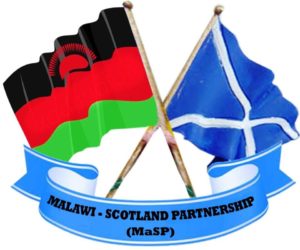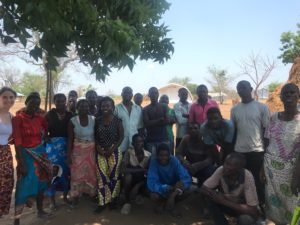Cyclone disaster management: PhD internship diary
 PhD Intern: Hebe Nicholson, School of Geography & Sustainable Development
PhD Intern: Hebe Nicholson, School of Geography & Sustainable Development
The KE & Impact PhD internship was a great opportunity for me to build on existing knowledge and contacts from my PhD research to produce a report on Indian Ocean weather systems and cyclone disaster preparedness management for stakeholders in Malawi and interested stakeholders in Scotland. It also enabled stronger ties to be built between the School of Geography & Sustainable Development School, the  Scotland Malawi Partnership in Edinburgh, and the Malawi Scotland Partnership in Lilongwe. Building relationships is a main objective of the KE Impact Fund PhD internships, and I hope and believe these relationships will be long lasting!
Scotland Malawi Partnership in Edinburgh, and the Malawi Scotland Partnership in Lilongwe. Building relationships is a main objective of the KE Impact Fund PhD internships, and I hope and believe these relationships will be long lasting!
My PhD is in the School of Geography & Sustainable Development and explores the use of government resettlement as a strategy to adapt to increasingly severe flooding in the Lower Shire Region of Malawi. So, when Cyclone Idai struck this region along with Mozambique and Zimbabwe in March 2019 and caused widespread flooding, I was concerned for the impact it made on the region. As I read more about, I also became more interested in how this flooding was managed. It is quite rare for Malawi and Zimbabwe to be badly impacted by cyclones, as they are landlocked countries. Cyclones are different weather systems, to the monsoonal rain that normally causes flooding. This means they are predicted differently, in that they can only be predicted a few days before they make landfall, and so are not in any seasonal forecasts. They also produce continuous rain and strong winds, whereas monsoonal rain usually occurs around the same time each day. So, I became curious to see what difference, if any, this made to how the flooding was managed in Malawi.
After discussing it further with my supervisor, Dr David McCollum, and two colleagues, Dr Tim Raub and Dr Richard Bates, from the School of Earth and Environmental Sciences, we decided to make an application to the Knowledge Exchange Impact Fund for a scoping project that would explore how Cyclone Idai had impacted (if at all) disaster management in Malawi. I would be the PhD intern because of my existing knowledge of disaster management in Malawi.
We received the go ahead in the summer and made arrangements for the project to start in earnest in September, when I packed my bags for two months fieldwork in Malawi. The fieldwork was to involve interviews with relevant stakeholders in national and local government, academia and NGOs, as well as focus group discussions with community members in three flood-impacted communities in the Lower Shire Region. I was excited at the prospect of returning and seeing the people I had worked with before.

For the project, we were lucky enough to have a Malawian assistant researcher, Joanne, to help with the fieldwork. Joanne was an undergraduate in environmental sciences at LUANAR (Lilongwe University of Agriculture and Natural Resources) and was a great help throughout the project. I did not have a research assistant for my PhD fieldwork and the difference it made for this short trip was impressive. Joanne was very enthusiastic about the project and we made a good team. She had lots of knowledge on the environmental science side of things, as well as knowing everything about Malawi, and I was more experienced in the process of conducting interviews and analysing interview data. We also had the help of Malawi Scotland Partnership in Lilongwe, and Scotland Malawi Partnership in Edinburgh who advised and supported us throughout this project.
We started off in the capital, Lilongwe, where we conducted ten 30-60-minute in-depth interviews with stakeholders in government, academia and relevant NGOs. Half of these stakeholders I had worked with in my PhD fieldwork in 2017. We asked questions about their involvement in Cyclone Idai, the response and their opinion on the impact of cyclones in Malawi. At first, the government was not that enthused by our research. They suggested that Malawi was more impacted by other types of disasters than cyclones, particularly as a land-locked country. However, when we went down to Blantyre and interviewed two further stakeholders in government, we found that the very severe flooding in 2015 was due to a weather system from the Indian Ocean, and not from monsoonal rains, as I, and many of my Malawian colleagues, had previously thought. This suggested to us that there was some relevance in exploring further how weather systems from the Indian Ocean differed from those from monsoonal rains, and what this meant for disaster management and preparedness.
We also conducted interviews with local government officials in two southern districts: Chikwawa and Nsanje, as well as focus groups with community members in three flooding impacted communities in these districts. This was particularly special for me, because I had worked with these officials and communities quite closely in my PhD fieldwork, so it was fantastic to be able to meet and discuss with them again. These interviews and focus groups also gave us a better picture of the impact and response on the ground in the affected areas.
At the end of the fieldwork period, my supervisor came out to join us in Lilongwe, and we held a small workshop with eight people we had interviewed in that city. It was a lively discussion in which we received great input which contributed to the final report produced by the end of the project.
The final part of the project consisted of the Malawian researcher, Joanne, coming to Scotland for the Scottish dissemination aspect of the project. She came for five days and we did a dissemination presentation at the University of St Andrews as well as to the staff at Scotland Malawi Partnership in Edinburgh. She had never been to the UK before, and whilst finding Scotland sufficiently freezing in November, we also managed to have a lovely time doing some site-seeing in Edinburgh!